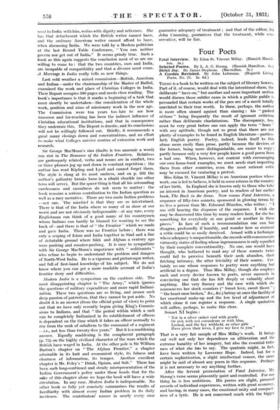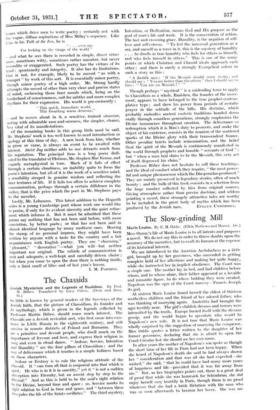Four Poets
A Garden Revisited. By John Lehmann. (Hogarth Living Poets, No. 21. 3s. 6d.)
THERE is a book to be written on the subject of literary hoaxes. Part of it, of course, would deal with the intentional sham, the deliberate " have-on," but another and more important section would discuss those subtler cases in which a gullible public is persuaded that certain works of the pen are of a merit totally unrelated to their true worth. In these, perhaps, the author is more often sinned against than sinning : his gushed reclame" being frequently the result of ignorant criticism rather than deliberate charlatanism. The discrepancy, too. must be very great before one can apply the term " hoax with any aptitude, though not so great that there are not plenty of examples to be found in English literature—particu- larly English poetry. Poetry, indeed, lends itself to this abuse more easily than prose, partly because the devices of the former, being more distinguishable, are easier to copy ; partly because only a very few people know a good poem from a bad one. When, however, not content with encouraging our own home-bred examples, we must needs start importing them from other countries, even the most reticent critic may be excused for venturing a protest.
Miss Edna St. Vincent Millay is an American poetess whose work, one is led to believe, is held in some esteem in the country of her birth. In England she is known only to those who take an interest in American poetry, and to readers of her earlier book, The Buck in the Snow. Now comes Fatal Interview, a sequence of fifty-two sonnets, sponsored in glowing terms by no less a person than Mr. Edmund Blunden, who writes : I am still hearing the diapason of the sequence. I wish she may be discovered this time by many readers here, for she has something for everybody at one point or another in these pieces." In face of such a recommendation one can but disagree, profoundly if humbly, and wonder how so eminent a critic could be so easily deceived. Armed with a technique whose adequacy is unquestionable, she records with consummate virtuosity states of feeling whose ingenuousness is only equalled by their complete conventionality. No one, one would have thought, who bothered to read any of these sonnets twice could fail to perceive beneath their arch abandon, their fetching intimacy, the utter triviality of their source. Cer- tainly no one whose responses to poetry were anything but artificial to a degree. Thus Miss Millay, though she employs each and every device known to poets, never succeeds in convincing one that she has felt deeply or valuably about anything. Her very fluency and the ease with which she manoeuvres her stock counters (" Sweet love, sweet thorn " ; the heart onoe broken," &c., &c.) betray at once the facility of her emotional make-up and the low level of adjustment at which alone it can register a response. A single quotation will suffice, perhaps, to make this clear.
Sonnet XI begins : Not in a silver casket cool with pearls Or rich with red corundrum or with blue, Locked, and the key withheld, as other girls Have given their loves, I give my love to you."
That is a very fair sample of Miss Millay's work. It brings out well not only her dependence on alliteration and the extreme banality of her imagery, but also the essential trite- ness of what she has to say. The quatrain might, in fact. have been written by Lawrence Hope. Indeed, but for a certain sophistication, a slight intellectual veneer, the same might be said of almost any poem in this sequence. Perhaps it is not necessary to say anything further.
After the fervent protestation of Fatal Interview, Mr. Strong's verse seems pleasantly quiet and controlled. For one thing he is less ambitious. His poems are slight, personal records of individual experiences, written with great economy. and having, in many cases, the emotional unity and compact- ness of a lyric. He is not concerned much with the bigger issues which drive men to write poetry ; certainly not with the vague, diffuse aspirations of Miss Millay's sequence. Like Mos in his Talk at the Inn, he is
" . . . ever one For looking on the visage of the world " — and what he sees there is recorded in simple, direct utter- ance, sometimes witty, sometimes rather macabre, but never recondite or exaggerated. Such poetry has the virtues of its kind : spontaneity and integrity. It also has its limitations. One is not, for example; likely to be moved ," as with a trumpet " by work of this sort. It is essentially minor poetry, though minor poetry of a high order. Mr. Strong hardly attempts the record of other than very clear and precise states of mind, eschewing those finer moods which, being on the borderland of. consciousness, call for subtler and more complek rhythms for their expression. His world is pre-eminently " This quick, immediate world, This breathing warm demesne," --and he moves about in it, a sensitive, trained observer, noting with admirable ease and sureness, the simpler, clearer, less vital-of its manifestations.
Of the remaining books in this group little need be said. Mr. Stephens' work is too well known to need introduction or: apology at this time of day. A new book from him, whether in prose or verse, is always an event to be awaited with interest. Strict Joy neither adds to nor detracts much from his reputation. The principal item is a long poem dedi- cated to the translator of Plautus, Mr. Stephen Mac Kenna, and vaguely metaphysical in tone. Much of it fails of effect through a certain cloudiness, an inability quite to focus the poem's intention, but all of it is the work of a sensitive mind, a sensibility steeped in genuine wisdom and reflecting the liner textures of life. If it fails too often to achieve complete communication, perhaps through a certain diffidence in the writer, that is the price which the poet in Mr. Stephens pays to the novelist.
Lastly, Mr. Lehmann. This latest addition to the Hogarth series is a young Cambridge poet whose work one would like to praise, if only for its evident sincerity and the quiet refine- ment which informs it. But it must be admitted that these poems say nothing that has not been said before, with more conviction, by better poets ; or that has not been said in almost identical language by many mediocre ones. Bearing the stamp of no personal impress, they might have been written by anyone with a taste for the country and a fair acquaintance with English poetry. They are " charming," pleasant," " decorative "—what you will—but neither important nor original. The vehicle of communication is neat and adequate, a well-kept and carefully driven chaise ; but when you come to open the door there is nothing inside, only a faint smell of lilies and of last year's leaves.
I. M. PARSONS.







































 Previous page
Previous page